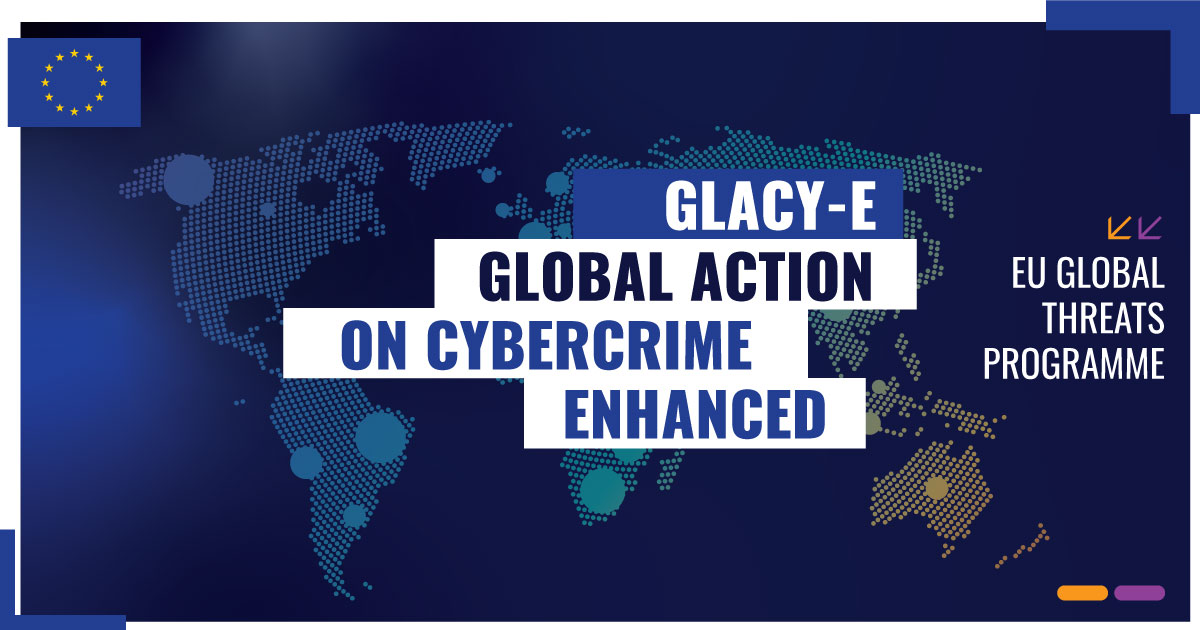
Context
The GLACY-e (Global Action on Cybercrime Enhanced), launched in December 2023, is a joint project of the European Union and the Council of Europe, financed by the European Union with Council of Europe’s co-funding.
Eight countries in Africa, Asia/Pacific and Latin America serve as hubs and multipliers to share experience, tools, and good practices with the countries of their respective region. Building on the expertise and the experience gained by the hub countries in the previous GLACY+ project, this project addresses specific needs of 26 selected countries in the Global South that are either Parties to the Budapest Convention on Cybercrime or have been invited to accede.
Overall objective
This project aims to strengthen the capacities of States worldwide to apply legislation on cybercrime and electronic evidence, and to enhance their abilities for effective international cooperation in this area and foster South-South cooperation.
Specific objectives
- To promote the adoption and implementation of consistent cybercrime legislation, policies, and strategies.
- To strengthen the capacity of police authorities to investigate cybercrime and engage in effective police-to-police cooperation.
- To enable criminal justice authorities to apply legislation and prosecute and adjudicate cases of cybercrime and electronic evidence and engage in international cooperation, in line with international human rights and rule of law standards.
- To strengthen the capacities of hub countries in building capacity on cybercrime and electronic evidence in their regions and foster their regional role in South-South cooperation.
Concrete activities
- Support to ongoing legislative reforms in Guatemala and Malawi.
- Ongoing cooperation with the Pacific Islands Law Officers’ Network (PILON) in the development of a Handbook on implementation of cybercrime laws.
- Delivery of the Digital Security Challenge and Cyber Games workshop in Kuala Lumpur.
- Implementation of a train-the-trainers introductory course at state level in Brazil (hybrid).
- Formulation of advice to Colombia on mainstreaming the cybercrime training modules in the curricula of the judicial academies.
- Strengthening of the role and responsibilities of 24/7 points of contact in Fiji, Côte D’Ivoire, Benin and Cameroon.
- Support to the 10th Meeting of the Americas Working Group of Head of Units.
Expected results
- Improving cybercrime, e-evidence, and data protection laws and strategies in line with the Budapest Convention and human rights standards in hub, selected, and additional countries.
- Enhancing international and regional policy and strategic cooperation on cybercrime.
- Building the capacity of cybercrime and forensics units within police forces and improving international police cooperation, including the inter-agency coordination between police, FIUs, and prosecutors to target online crime proceeds and improve asset recovery.
- Equipping criminal justice actors with knowledge and skills on cybercrime and e-evidence.
- Expanding judicial cooperation and peer learning, including through a global network of national judicial trainers.
- Positioning hub countries as centres of expertise and best practice on cybercrime investigations and prosecutions at regional level, and delivering regional training on cybercrime and e-evidence through police and judicial academies in hub countries.
Achievements1[1]
- Since November 2024, Ecuador, Fiji, Rwanda, Sao Tome and Principe and Vanuatu became Parties of the Budapest Convention, and Fiji and Peru have signed the Second Additional Protocol.
- Sierra Leone has drafted their Standard Operating Procedures on collection and handling of electronic evidence.
- Fiji has drafted their Data Protection Policy.
- 41 servers seized and 32 suspects arrested during INTERPOL’s Operation Secure[1], supported by the project.
- 40 Kenyan law enforcement officers and prosecutors trained on first responders’ responsibilities.
- 25 state prosecutors were trained by the federal trainers from the pool of national trainers developed by the project.
- 70 representatives from 20 countries, 4 international organisations and 11 private sector partners joined the 10th Americas Working Group (AME-WG) on Cybercrime for Heads of Units
1 Consolidated results and impact of the GLACY-e project and its previous phase: https://rm.coe.int/glacy-projects-2016-2024-page1-/1680b66e7a
- Project duration
- 1 Aug 2023 - 1 Dec 2028
- Project locations
- ArgentinaBeninBrazilCameroonCabo VerdeChileColombiaCosta RicaCôte d’IvoireDominican RepublicEcuadorFijiGhanaGuatemalaKenyaKiribatiMalawiMauritiusMexicoNigeriaPanamaParaguayPapua New GuineaPeruPhilippinesRwandaSão Tomé and PríncipeSenegalSierra LeoneSri LankaTimor-LesteTongaUruguayVanuatu
- Overall budget
- €13 334 000
- Threat area
- Fight against Organised Crime
- Critical Infrastructure Protection
